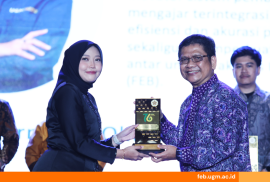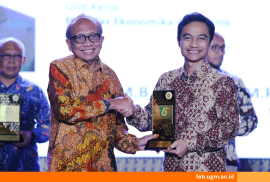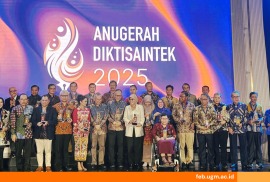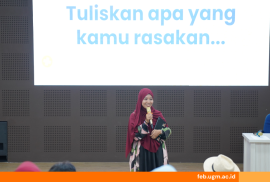Tuesday (8/10), the Faculty of Economics and Business Universitas Gadjah Mada (FEB UGM) held a guest lecture at the Learning Center Building, 8th floor. Taking the theme of Big Data and Business Analytics: Its Impact on Business, the faculty took Dr. Joe F. Hair, Jr. and Dr. Bob G. Wood from the University of South Alabama as the speakers. This event was held in response to the increasingly widespread use of big data in every line of life, including in the business world.
In the first session, Joe quoted Tom Peters in his book Triving on Chaos (1991) which states that we are drowning in information and starved for knowledge. It is estimated that in the next three years, humans will produce more data than in the last 1,000 years and almost everything is digital. Big data can be interpreted as data sets that are very large and complex and difficult to capture, process, store, search, and analyze using conventional database systems.
In 2014, the amount of information was 4.4 zettabytes and is expected to reach 44 zettabytes in 2020. Zettabytes is a measure of storage capacity equivalent to 1 sextillion bytes. One zettabyte is estimated to equal 1,000 exabytes or one billion terabytes. Interestingly, humans are able to produce 2.5 exabytes each day. This figure was also contributed by an increase in data from online transactions, low data collection and storage costs, increased user interfaces, the existence of new analytical techniques, to the influence of the global marketplace.
On the other hand, only 5% of data can be converted into information. Even though data analytics certainly plays an important role in forming decision models with the contribution of machine learning and artificial intelligence. Therefore, data analytics skills are needed to respond to increasingly massive technological developments.
The second session continued with the explanation of material on statistical analysis with historical perspective. In his presentation, he explained about the history of the discovery of basic statistics to talk about big data which is now transformed into data analytics.
“At present, there is no need to be a statistician who is trained or knows how to write computer programs,” he said. He explained, now what was needed was an understanding of how to design learning, choosing the right method, applying assumptions and rules of thumb, and identifying and handling “red flags” in an outcome.
Source: Sony B and Leila C Z




